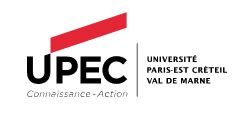Master's degree Urban Environments


Entry requirements
Admission to M2 is open to students who have completed 240 ECTS in the fields of urban planning, architecture, geography, landscaping, political science, environmental science, sociology, law, etc. Students are admitted on the basis of their application, a written exam and an interview. Before starting the course, students are expected to have knowledge and skills relating to the fundamentals of urban planning (discipline-specific and methodological approaches, understanding challenges in organisation of urban space). For foreign students, a good level of French (C1 level) is required.
Benefits of the program
Course co-accredited by two universities (Université Gustave Eiffel and Université Paris-Est Créteil - UPEC) and aims to introduce students to professional situations, through diagnosis workshops based on real projects in which they will issue recommendations, which take place throughout the entire programme. The teaching team is made up of faculty members from EUP’s research laboratories — Lab’Urba and LATTS (Techniques, Territories and Societies Laboratory) — and specialised in environmental issues and urban services. It also includes professionals working in the environmental sector and environmental urban planning, thereby opening a huge professional network to students. There is an overseas study trip at the end of the programme.
Acquired skills
Undertake urban planning and development actions that factor in sustainability, environmental, climate and energy-related themes, and contribute to structuring debate around these issues. Students must also be able to account for the high level of interdependence between planning, design and management of these issues.
International
The course includes an overseas study trip. Students who have completed M1 at EUP can study abroad in S3.
Capacities
40
Course venue
Your future career
The course prepares students for traditional careers in development and urban planning (design, planning, strategy, consulting, service management, etc.), but in which the ability to integrate environmental requirements and eco-systemic approaches are valued. Students can pursue their studies with a PhD.
Professional integration
Graduates may work at the following institutions: urban planning agencies, environmental urban planning design offices, local authorities, natural regional parks, the French Agency for Ecological Transition (Ademe), the Architecture, Urban Planning and Environment Council, NGOs/associations, regional environmental conservatories, etc.
Study objectives
Build critical expertise around environmental development issues.
Identify environmental issues that are related to the functioning of territories, their theoretical foundations and how they translate in legislative, regulatory and operational terms, etc.
Understand how these issues are included in decision-making processes in urban planning and development at different levels.
Understand, master and apply environmental development tools, particularly through the workshops.
Major thematics of study
Urban planning, spatial planning, environmental science.
Calendar
Classes run from September to the end of March. Work placement of four to six months from April.
Options
Optional modules are offered for a research-focused curriculum.
Semester 3
Semester 4
| Courses | ECTS | CM | TD | TP |
|---|---|---|---|---|
|
Activités communes
| 3 | 30h | ||
|
Approfondissements thématiques 1
| 4 | 20h | 20h | |
|
OPTION 1
| 2 | 10h | 10h | |
|
OPTION 2
| 2 | 10h | 10h | |
|
OPTION 3
| 2 | 10h | 10h | |
|
OPTION 4
| 2 | 10h | 10h | |
|
Approfondissements thématiques 2
| 4 | 20h | 20h | |
|
OPTION 2
| 2 | 10h | 10h | |
|
OPTION 3
| 2 | 10h | 10h | |
|
OPTION 4
| 2 | 10h | 10h | |
|
OPTION 5
| 2 | 10h | 10h | |
|
Etudes de cas et journées thématiques
| 3 | 60h | ||
|
Atelier volet préconisations
| 5 | 50h | ||
| *Option professionnelle | 13 | |||
|
Mémoire
Teaching language FRANÇAIS / FRENCH | 10 | 20h | ||
|
Séminaire Méthodologique
| 3 | 20h | ||
| *Option recherche | 13 | |||
|
Théories et pratiques de la recherche en urbanisme
| 3 | 30h | ||
|
Mémoire de recherche
| 10 | 10h |
Ana Cristina TORRES
Partners

Avec des collectivités locales de la région parisienne, grands organismes environnementaux (ADEME / ARB IDF, etc.), entreprises privées dans le champ de l’environnement et/ou du paysage, bailleurs sociaux, etc.

